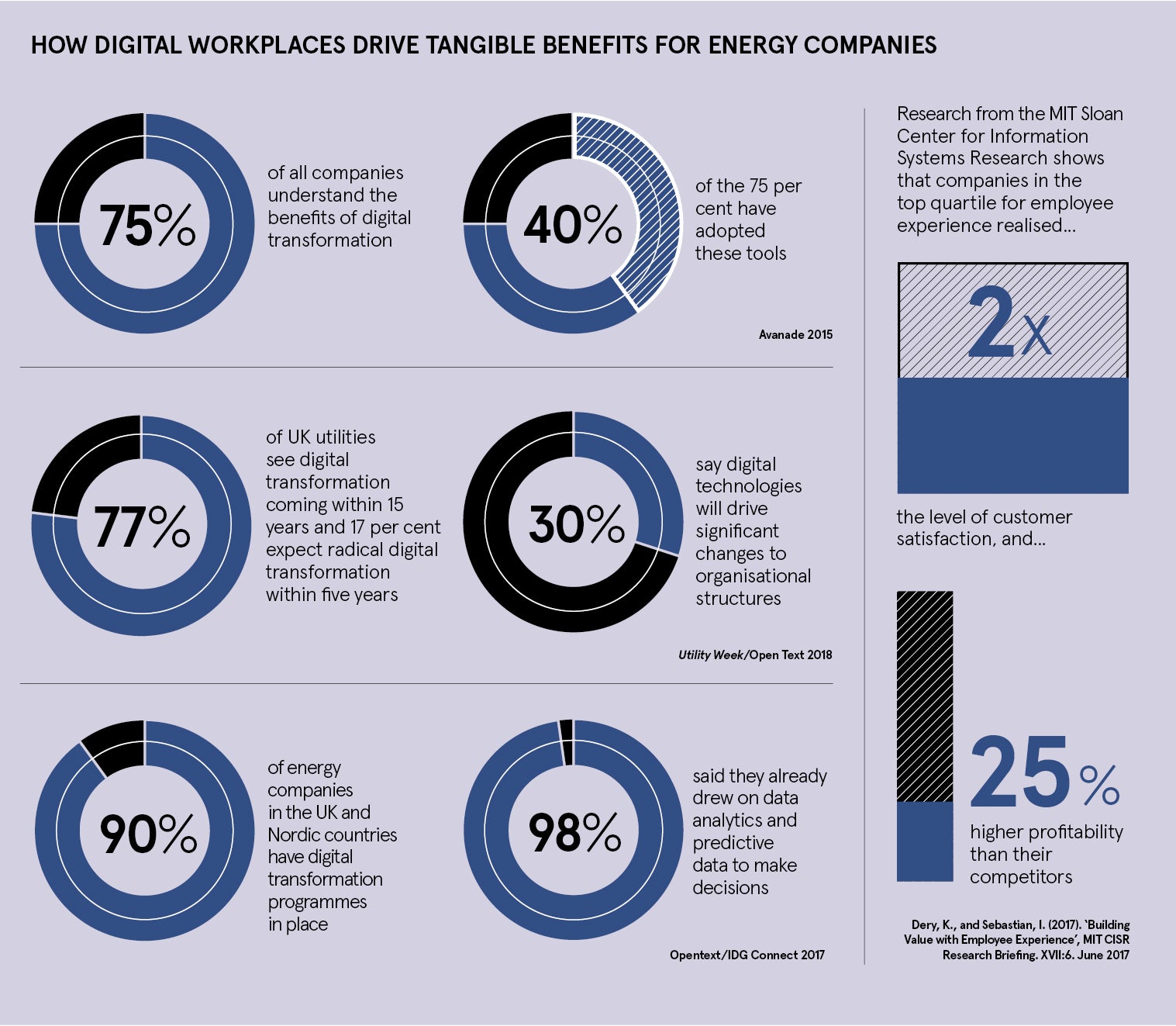Research by OpenText and IDG Connect shows that more than 90 per cent of energy companies in the UK and Nordic countries say they have digital transformation programmes in place. One of the problems is a misconception of what digital transformation actually is.
“Companies often equate digital transformation with IT transformation,” says Dr Gianvito Lanzolla, professor of strategic leadership at Cass Business School. “That is a recipe for disaster.”
Chris Bingham, vice president for the oil, gas and utilities sector at Avanade Europe, a digital innovator formed in 2000 by industry giants Microsoft and Accenture, says: “When we look at what the market is saying, many people associate digital transformation with technology implementation. Yet when you look at best in class, those organisations also have a clear focus on transforming their employee experience as well as their business operations.”
Avanade, which works with many large oil, gas and utilities companies, including Centrica as well as smaller organisations such as Tullow Oil and Subsea 7, believes that to truly transform to be digital on the outside, they need to be digital on the inside. This means engaging employees and helping them improve their ways of working, leveraging their technology investments. And for good reason.
Research led by Dr Kristine Dery, a research scientist at MIT’s Center for Information Systems Research, says the top quartile of companies based on rating of employee experience enjoy twice the level of customer satisfaction and twice the level of innovation as other companies. As a result, these companies are 26 per cent more profitable, not just because of better customer satisfaction and innovation, but also because they are reducing their costs and identifying new streams of revenue.
While energy companies believe they are on track with digital transformation, across industry as a whole there is work to do.
A 2015 global survey from Avanade found that while 75 per cent of companies across all sectors understand the benefits of digital transformation, only 40 per cent have actually adopted such tools.
Paul Beaumont, modern workplace business lead at Avanade Europe, says things have moved on since the survey, but there is still more to do. “Many organisations still talk about digital transformation without recognising the need or opportunity to make meaningful business transformation,” he says.
Centrica, however, has successfully grasped digital transformation. Centrica Energy Marketing & Trading (EM&T) engaged Avanade’s Managed Services Team for support with more than 100 trading platform custom applications. Avanade works with Centrica using a combination of onshore and offshore resources for ongoing application management, application development and application portfolio management.
The partnership has led to a 50 per cent increase in trading volume, 50 per cent reduction in downtime incidents and a 60 per cent reduction in the time taken to resolve incidents.
“IT used to be the bottleneck on anything that needed to get done,” says Stuart Beeston, Centrica EM&T chief operations officer. “Since working with Avanade, we have a track record of meeting business needs. IT is now an asset that gives the business confidence to
explore opportunities.”

Building a successful digital workplace depends on having the right technology partners and Avanade has been awarded Microsoft’s number one systems integrator for 11 years in a row.
Chief information officers (CIOs) are also recognising Microsoft’s strength in digital transformation and ranked the company as its top vendor in Morgan Stanley’s annual CIOs survey in 2018.
“The company’s new CEO Satya Nadella has changed its focus and Microsoft’s extremely successful cloud platform Azure has allowed them to rotate. Microsoft now plays nicely with companies such as SAP and Adobe which were previously ‘sworn enemies’,” says Avanade’s UK and Ireland chief technology officer Mark Corley.
Better data analytics, in particular, is helping energy companies transform the way they operate and many are already doing so; 98 per cent of energy companies surveyed say they already draw on data analytics and predictive data to make decisions.
Stanley Louw, Avanade’s UK and Ireland head of digital innovation, shares an example of how this is working in practice. “We have been helping one company to manage when drill bits are breaking and using data to understand the best way to prevent or fix them,” he says.
While energy companies feel they have digital transformation under control, the picture in the utilities sector looks less developed.
One recent study from OpenText shows 77 per cent of UK utilities see digital transformation coming within fifteen years and 17 per cent expect radical digital transformation within five years. Some 30 per cent say digital technologies will drive significant changes to organisational structures.
Mr Corley agrees that utilities are ripe for transforming into digital workplaces. “In many utilities, we still see Windows 7 and XP, and there is an absence of unified communication and collaboration. That is a massive opportunity,” he says.
Avanade Europe’s Mr Bingham says: “Utilities have done things the same way for a very long time and they have thrown armies of people at problems rather than automation, and have made do with out-of-date IT. We are starting to see that turn.”
Mr Beaumont adds: “We have helped one of the world’s largest investor-owned electrical utilities invent a new operating model which no longer focuses just on the IT organisation. The model is based on constant change and evolution. It is also being driven by the business for the business; IT no longer has the sole responsibility for driving technology change.”
Making digital transformation less about technology and more about the business is going to be crucial for the survival of the energy and utilities sector in a challenge-strewn road to the future that includes climate change, the move away from fossil fuels to renewables, and a world of geopolitical tension and protectionism.
Avanade believe that to transform your organisation to meet this future, the real work needs to start at home.
For more information please visit avanade.com






